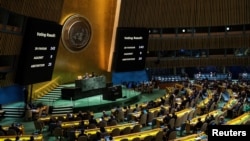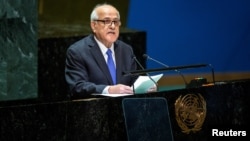The U.N. General Assembly voted overwhelmingly Friday in a show of support for Palestinian statehood, and as a cease-fire remains out of reach in the seven-month war between Israel and Hamas militants that has killed tens of thousands of Palestinians.
“A ‘yes’ vote is a vote for Palestinian existence; it is not against any state,” Palestinian Ambassador Riyad Mansour said before the vote in an emotional speech.
“But it is against attempts to deprive us of our state.”
The General Assembly voted 143 in favor, nine against, with 25 abstentions, for a resolution that “determines that the State of Palestine is qualified” for U.N. membership under the organization’s charter and recommending that the U.N. Security Council “reconsider favorably” its full membership in the United Nations.
The 15-nation council must recommend a potential member’s application to the General Assembly for final approval and admission. The United States used its Security Council veto on April 18, to stop the process. It voted “no” again Friday in the General Assembly.
“Our vote does not reflect opposition to Palestinian statehood; we have been very clear that we support it and seek to advance it meaningfully,” Deputy U.S. Ambassador to the U.N. Robert Wood said. “Instead, it is an acknowledgement that statehood will come only from a process that involves direct negotiations between the parties.”
Israel’s envoy voiced loud opposition to the resolution, saying it would give rights to Hamas terrorists.
“So here it is, I present to you the future outcome of today’s vote: soon-to-be President Yahya Sinwar, tyrant of the state of Hamas, sponsored by the U.N.,” Ambassador Gilad Erdan said, holding up a placard with a photo of the Hamas leader with the words “President Sinwar” printed on it. “And he owes his deepest gratitude to you – the General Assembly.”
The Palestinians are represented at the United Nations by the Palestinian Authority, not Hamas, and the two groups have long been at odds with each other. Israel says it will continue its war in Gaza until Hamas is eliminated.
Practical effects
General Assembly resolutions are not legally binding, but they do carry the moral weight of the international community. The support of 143 countries sends a clear signal of how the international community feels about the issue of Palestinian statehood.
“I think the vote shows that most U.N. members not only want a cease-fire in Gaza, but actually want a more fundamental long-term solution to the Palestinian question based on a two-state solution,” Richard Gowan, U.N. director for the International Crisis Group told VOA.
U.S. envoy Wood indicated that if the matter returns to the Security Council, Washington’s position would remain unchanged — that statehood must come through direct Israeli-Palestinian negotiations.
The Palestinians currently have nonmember observer state status, which means they cannot vote, but they can participate in meetings and can join U.N. bodies like the World Health Organization and the International Criminal Court.
Wood emphasized that Friday’s resolution would not enhance their rights.
“As a result of this vote, the Palestinian nonmember state observer mission has not gained the right to vote in the General Assembly,” Wood said. “It also has not gained the right to put forward candidates in U.N. organs or to be elected as a member of the Security Council. In short, the Palestinians’ nonmember state observer mission does not have the same standing as a member state after this vote.”
That could also be a message to the U.S. Congress, which under legislation from the 1990s has the power to cut funding to the United Nations should it unilaterally admit the Palestinians.
On Thursday, 25 Republican senators, led by Senator Mitt Romney of Utah, introduced legislation to update the existing law. Calling it the “No Official Palestine Entry Act of 2024,” or “NOPE,” it would limit funds to the United Nations and other organizations “that provide any status, rights, or privileges beyond observer status” to the Palestinians.
Analyst Gowan said the final text was carefully written not to trigger a U.S. funding freeze.
“I think U.S. diplomats and their allies had made it very clear to the Palestinians that they could unintentionally blow up the U.N., and they should have avoided this,” Gowan said. “But if Congress now changes the rules, in line with Romney's proposal yesterday, there could still be a blowback for the U.N. budget.”






